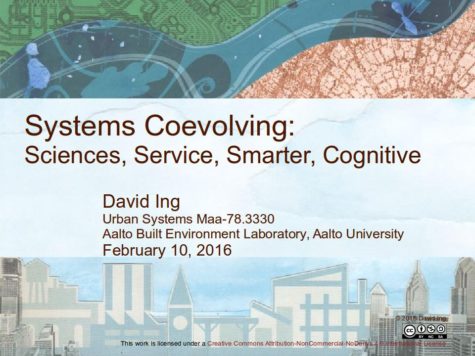Video and audio recordings of my lecture for the Urban Systems course at Aalto University in February have now been produced. While I was in Finland teaching in another department, I was asked to lecture on Smarter Cities.
Here’s the abstract that was sent in advance:
The popularization of the Smarter Cities movement coincided with IBM’s campaign originating from 2009. The Smarter Cities ideas was an outgrowth from the Smarter Planet initiatives, which had emerged from the IBM Global Innovation Outlooks beginning in 2004.
This speaker was a consultant at IBM involved in Smarter Cities engagements, while simultanously conducing research into Service Systems Science.
The evolution of ideas both outside and inside IBM are reviewed, through a history of (i) systems sciences; (ii) service science, management, engineering and design (SSMED), (iii) service systems science; and (iv) smarter planet and smarter cities. Looking forward, the prospects for the (v) cognitive era and a (vi) service systems thinking is outlined.
| Audio | [20160210_Aalto_UrbanSystems_Ing_SystemsCoevolving.mp3] (79MB, 1h22m24s) [20160210_Aalto_UrbanSystems_Ing_SystemsCoevolving_plus3db.mp3] (volume boosted 3db, 79MB, 1h22m24s) |
||
| Video | HD (1h22m09s) | ||
| H.264 MP4 | [1280×720 417Kbps m4v] (270MB) |
[1280×720 3779Kbps m4v] (2.3GB) [on archive.org] |
|
| WebM | [1280×720 316Kbps webm] (270MB) |
[1280×720 3604Kbps m4v] (2.4GB) |
|
As a quicker reference, the slides may be useful if fast-forwarding to a specific section is desired.
Video and audio recordings of my lecture for the Urban Systems course at Aalto University in February have now been produced. While I was in Finland teaching in another department, I was asked to lecture on Smarter Cities.
Here’s the abstract that was sent in advance:
The popularization of the Smarter Cities movement coincided with IBM’s campaign originating from 2009. The Smarter Cities ideas was an outgrowth from the Smarter Planet initiatives, which had emerged from the IBM Global Innovation Outlooks beginning in 2004.
This speaker was a consultant at IBM involved in Smarter Cities engagements, while simultanously conducing research into Service Systems Science.
The evolution of ideas both outside and inside IBM are reviewed, through a history of (i) systems sciences; (ii) service science, management, engineering and design (SSMED), (iii) service systems science; and (iv) smarter planet and smarter cities. Looking forward, the prospects for the (v) cognitive era and a (vi) service systems thinking is outlined.
| Audio | [20160210_Aalto_UrbanSystems_Ing_SystemsCoevolving.mp3] (79MB, 1h22m24s) [20160210_Aalto_UrbanSystems_Ing_SystemsCoevolving_plus3db.mp3] (volume boosted 3db, 79MB, 1h22m24s) |
||
| Video | HD (1h22m09s) | ||
| H.264 MP4 | [1280×720 417Kbps m4v] (270MB) |
[1280×720 3779Kbps m4v] (2.3GB) [on archive.org] |
|
| WebM | [1280×720 316Kbps webm] (270MB) |
[1280×720 3604Kbps m4v] (2.4GB) |
|
As a quicker reference, the slides may be useful if fast-forwarding to a specific section is desired.



